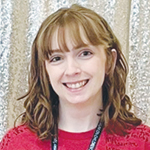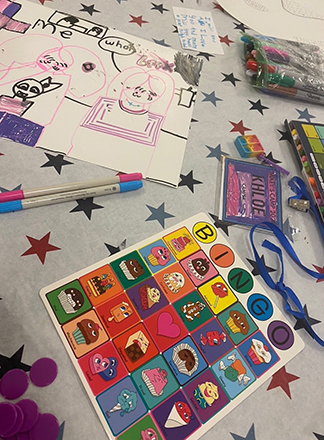
Luminarias with names of deceased family members line a walkway at Mikey's Camp, a part of a program called KIDZ'NGRIEF. The program, which offers support grieving children and teens, is a ministry of Bon Secours Mary Immaculate Hospital in Newport
News, Virginia.
Eruptions are meant to happen inside the volcano room.
Kids who enter the space on a church campus in Newport News, Virginia, can vent their emotions by bouncing on mini trampolines, throwing balls, jumping on pogo sticks, and smacking pool noodles on the floor to make a satisfying "thwack." They also can
drag around an oversized stuffed doll named Max.
 Walter
Walter
"He's bigger than me, and they can just absolutely beat him up," said Ariane Walter. "And they love that."
Walter is the bereavement and volunteer coordinator for a group called KIDZ'NGRIEF, a ministry supported by Bon Secours Mary Immaculate Hospital in Newport News, part of Bon Secours Hampton Roads, and Bon Secours Hampton Roads Foundation. KIDZ'NGRIEF
provides grief support for children ages 3-18 who have suffered a death loss, as well as groups for adults who bring children to the program that meet simultaneously. The group also holds a camp for grieving kids called Mikey's Camp every November.
 Pile
Pile
"I believe, and I've seen that evidence anecdotally, that children are much healthier when they deal out loud with their grief," said Beth Pile, who founded the group almost 25 years ago.
Back then, Pile saw families simply not talking about death with kids or sending kids away when a death was about to happen. "Children are called forgotten mourners," she said. "That's changing, and that's changed over the years."
Children and teens who come to KIDZ'NGRIEF meetings are divided into age groups. They don't have to talk if they don't want to. The program isn't psychotherapy, but it does offer grief support with trained facilitators through art, games, stories, play
and other activities.
The kids create soothing "calm down bottles" filled with glitter and glue, make artwork with colors that reflect their feelings, draw on blank puzzles that they can break apart and put back together. They also can break a plate and piece it back together
with gold-colored lacquer in the Japanese style of kintsugi, teaching them, Walter said, that they can be stronger than before.
She said one of the facilitators' biggest skills is reflection. "The kids say something, and we just repeat it back to them, which sounds weird, but once you see it in action, it's kind of amazing," she explained. "They just start sharing more and more,
and you just keep repeating it, and they just keep going and going. It's like they feel heard, maybe for the first time."
The facilitators try to guide the children and teens through three tasks of mourning: telling their story or as much as they know, dealing with their own thoughts and emotions, and finding ways to memorialize the person who died.

More children impacted
One in 12 children in the United States experiences the death of a parent or sibling by the age of 18, according to the Childhood Bereavement Estimation Model,
provided by Judi's House/JAG Institute, a research and education center.
Statistics show — and this is reflected in the KIDZ'NGRIEF group, Walter and Pile said — that more and more children are impacted by a death involving a drug overdose, suicide or gun violence. Grief following an accident is roughly three times more common
than from any other cause and grieving a death by suicide is roughly two times more common than grieving a death by homicide, according to the estimation model.
Because of the stigma sometimes attached to death by drugs or suicide, kids may not feel like they can talk about those deaths, Walter said. "We see a lot of families where the grown-ups are like, 'I was told not to talk about this, but clearly my kid
needs to talk about it. So what am I doing wrong?'" she said. "We'll say, 'You know, always be open and honest with them. It's tough to talk about, and we were told not to, but it's important to do that, and to give them some space, too.'"
Pile noted that young children might be unable to express their grief or to comprehend the permanence of death. When children are older, they want to know details, but sometimes adults want to protect them from those details. "They think kids can't handle
it," Pile said. "Kids can handle anything. And so we offer this continued support."
 Activities to help grieving children and teens express their emotions are part of meetings of KIDZ'NGRIEF and its annual Mikey's Camp.
Activities to help grieving children and teens express their emotions are part of meetings of KIDZ'NGRIEF and its annual Mikey's Camp.
She recalled a little boy who joined the program after his mother died of an overdose in a gas station bathroom.
"He was four, and he could not express himself. He did not have the words. And little kids, they show you in their body language what's going on with them. And this child had to run. He had to run, run, run, run, run," Pile said. "And all through the
meeting, he needed to go out in the hall with the facilitator and just run back and forth and not talk about it."
About a year later, the boy sat in the opening circle of a meeting with other children and one of them said that their mother died. "Well, then, this little child just sits up and he says, 'My mother died.' Somebody else says, 'Well, my mother died, too,'"
Pile recalled. "And then he started talking. That just shows you they have to hear it. It helps them to hear other kids talk about their losses."
Getting started
Pile started the group as a social worker at Bon Secours Mary Immaculate Hospital. She had been running grieving groups for adults and working for a hospice. The hospice started caring for patients with children, but
there was nothing in place to help them.
Pile gathered information from the Dougy Center in Portland, Oregon, the world's first peer grief support program for children; and from the National Alliance for Children's Grief. She learned that a group's name should show its purpose. She and a fellow social worker thought of the store Toys"R"Us and came up with the name KIDZ'NGRIEF.
Pile trained about 11 volunteer facilitators the first year. The program now has about 20, with a few more who can step in and substitute. The facilitators commit to a year of service, but some have stayed with the program for years.
Many families hear about the program through school counselors. The group meets twice a month at a church in Newport News. The program is free and there are no geographical boundaries for attendees. "If they can get to us, we're happy to have them come,"
Pile said.
Some people drive an hour and a half to attend sessions.
This fall, an offshoot after-school program started at three area elementary schools.
Validating emotions
Alex Harvey attends adult meetings while his 12-year-old son attends the ones for kids. When his son was 5, the boy's mother, Harvey's estranged wife, died from a firearm accident in a car. Harvey's son and stepdaughter
were in the car at the time.
Harvey, juggling his wife's estate and other family issues, didn't have a lot of money to spend on mental health care. "So I looked around, I said, 'There's got to be some community resources for this.' And I came across KIDZ'NGRIEF," he said.
 A camper at Mikey's Camp makes a craft to help express her emotions about a person she is grieving. Mikey's Camp is part of a program called KIDZ'NGRIEF in Newport News, Virginia, to support grieving children and teens.
A camper at Mikey's Camp makes a craft to help express her emotions about a person she is grieving. Mikey's Camp is part of a program called KIDZ'NGRIEF in Newport News, Virginia, to support grieving children and teens.
Harvey said his son has improved emotionally over the years. "And I'm not one to actually talk too much about what's going on in my personal life, but you know, later on, after a few years, I was able to actually talk about my issues as well," he said.
The program also has helped him talk to his son and validate the boy's feelings. "So very often, I'll just have this nice, candid conversation with him and understanding that if he starts to get emotional about it, I understand where it's coming from,"
Harvey said. "I'm not going to tell him, 'Buck up.' I'll be able to talk him through it and even tell him how I feel."
Yasmiere "Yaz" Burke, 19, started coming to KIDZ'NGRIEF when she was 12 after her father died of cancer. She now volunteers as a "big buddy" for kids during Mikey's Camp, which she attended herself. Mikey's Camp is named for Pile's late Burmese mountain
dog, who was a therapy dog for the kids.
"It was the best part of the year," Burke said of camp. "Just finding people around you at such a young age that understood you. You go to school and everybody is talking about, 'Oh, I hate my dad.' I wish he was in my life."
She recalled when she was younger, she returned from camp and told her mother: "Mom, dad's favorite color is blue." Her mom asked why she said that.
Burke explained that the camp gave her time to reflect. "Being a constant place where it's OK to think about your loved one that passed away, it allows you to remember things that you wouldn't remember in the constant speed of life," she said.
She added: "When I go into these spaces with these kids, and they're opening up and they're telling their story, and they're telling me their sister loved to go swimming, it reminds me, oh, my dad's favorite color is blue, and we used to love to go fishing
together."